Magento vs. Shopware vs. Shopify vs. WooCommerce: Core Differences
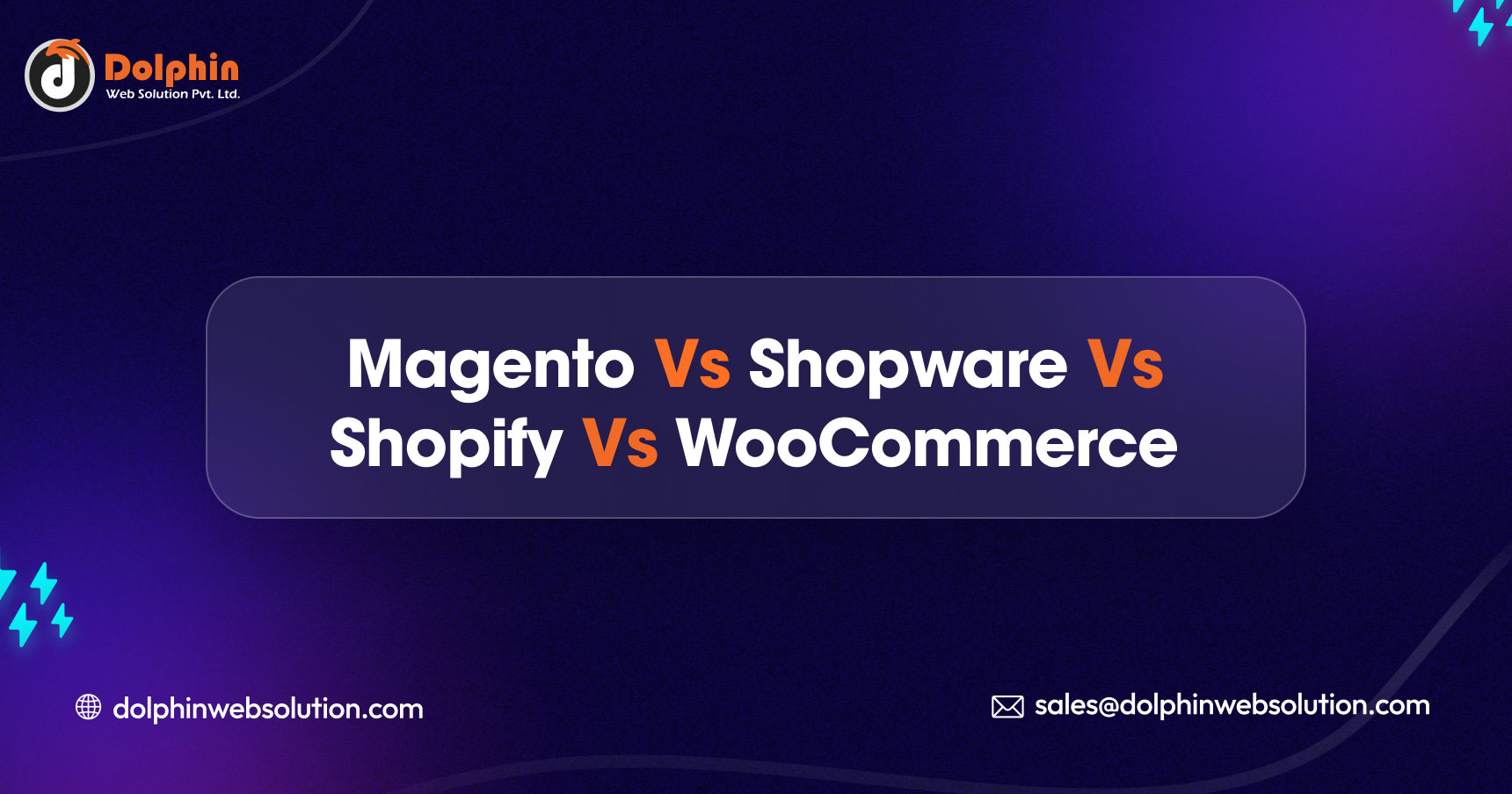
Table of Contents
Summary :
The blog thoroughly examines the four leading platforms—Magento, Shopware, Shopify, and WooCommerce—in the ever-expanding field of e-commerce solutions. Readers are given a comprehensive picture of the advantages and disadvantages of each option by carefully examining elements, including flexibility, scalability, usability, and available features.
Choosing the best platform for your online store is crucial and can significantly impact your company’s success in the dynamic world of e-commerce. It’s critical to comprehend various platforms’ characteristics, advantages, and disadvantages because so many possibilities are available, each catering to particular demands and interests. This thorough comparison examines the essential features of four well-known e-commerce behemoths—Magento, Shopware, Shopify, and WooCommerce.
Businesses of all sizes are looking for reliable solutions to set up and maintain their digital storefronts as online shopping grows in popularity. The variety of options can be thrilling and confusing, requiring a thorough examination of each platform’s offerings. The subtleties of these e-commerce powerhouses can significantly affect your operational efficiency and consumer pleasure, from flexibility and scalability to user-friendliness and customization options. Hire an ecommerce developer to get your website built on these platforms.
What is Magento?
Magneto is one of the best e-commerce systems. Its creators used open-source software to create it. This enables consumers to change their online business’s look, functionality, and content without disrupting the shopping experience. Additionally, Magento provides its users with many valuable tools and features. There are tools for marketing, SEO, and catalog management. Overall, the platform is usable by stores of any size. Whether you serve a few or a million customers, Magento offers a free Magento Open Source and a feature-rich Magento Commerce, allowing the platform to develop and adapt with your company. Businesses frequently need to swap media as their operations grow.
Nevertheless, Magento makes it simple to stay put while growing. Platform users can also choose from various plugins and themes to further personalize their web pages as they see fit. Additionally, they can enhance client interactions and solidify client connections.
Advantage of Magento
- Product and category creation is significantly simpler and faster than the alternative.
- It provides several templates and themes that let the Magento designer and store owner customize and optimise the appearance for mobile devices.
- The Admin interface in Magento 2 is fantastic and relatively straightforward. Non-technical administrators prefer the streamlined interface.
- The LESS preprocessor and CSS URL aid in improving performance, speeding up page load time and making the system search engine friendly.
- developed with modern development logic, making it easier for developers to work with because it is developer-friendly.
- The Luma theme for Magento 2 is a striking and simple-to-use theme. We can quickly and easily manage our online business with the Luma theme. Additionally, it aids in increasing the efficiency of order management, product creation, and customer data management.
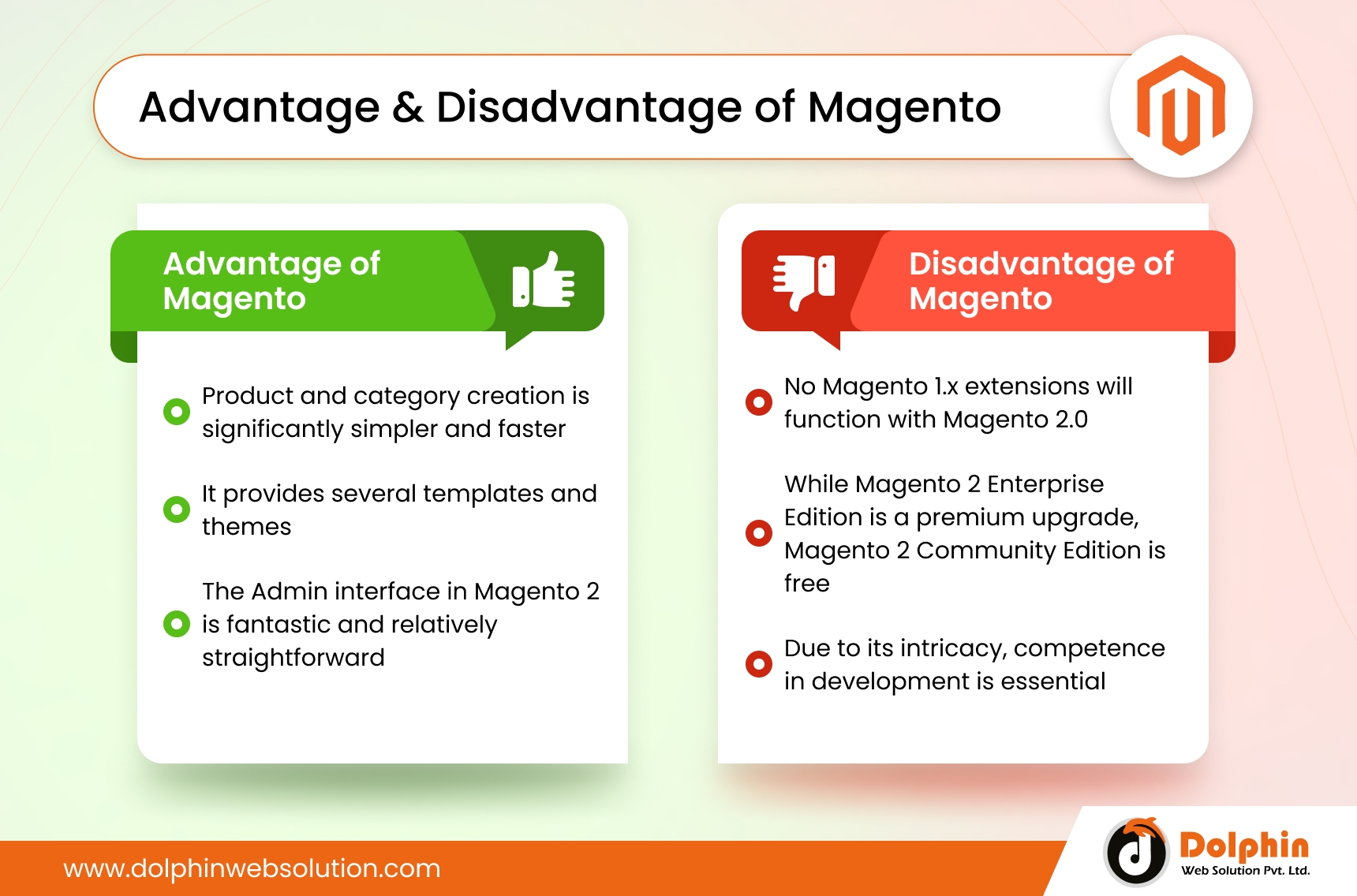
Disadvantage of Magento
- No Magento 1.x extensions will function with Magento 2.0. The extensions must be bought and integrated into Magento 2.
- While Magento 2 Enterprise Edition is a premium upgrade, Magento 2 Community Edition is free. The Magento 2 Enterprise Edition is a paid product.
- Due to its intricacy, competence in development is essential.
- The price is a touch high for the little shop. The enterprise edition of Magento 2 is pricey.
- Magento 2 demands powerful servers, slowing it down and making inputting data difficult.
What is Shopify?
Technically speaking, Shopify is a subscription-based software-as-a-service (SaaS) sales platform. Shopify offers four normal store membership levels, with monthly costs beginning at INR 1,994. All standard plans include a branded web store and a full range of physical and online selling tools. Additionally, for just INR 20 per month, Shopify offers a “Starter” option. Although it lacks an internet store, it does enable mobile POS sales and provides a Buy Button for selling on other websites, blogs, and email.
Each plan includes a complete set of business management tools. Product sourcing, sales and inventory tracking, payment processing, shipping, customer accounts, marketing, and reporting are all included in every Shopify plan. Numerous Shopify Apps also make it straightforward to expand your toolkit. To find out more, see our Shopify review.
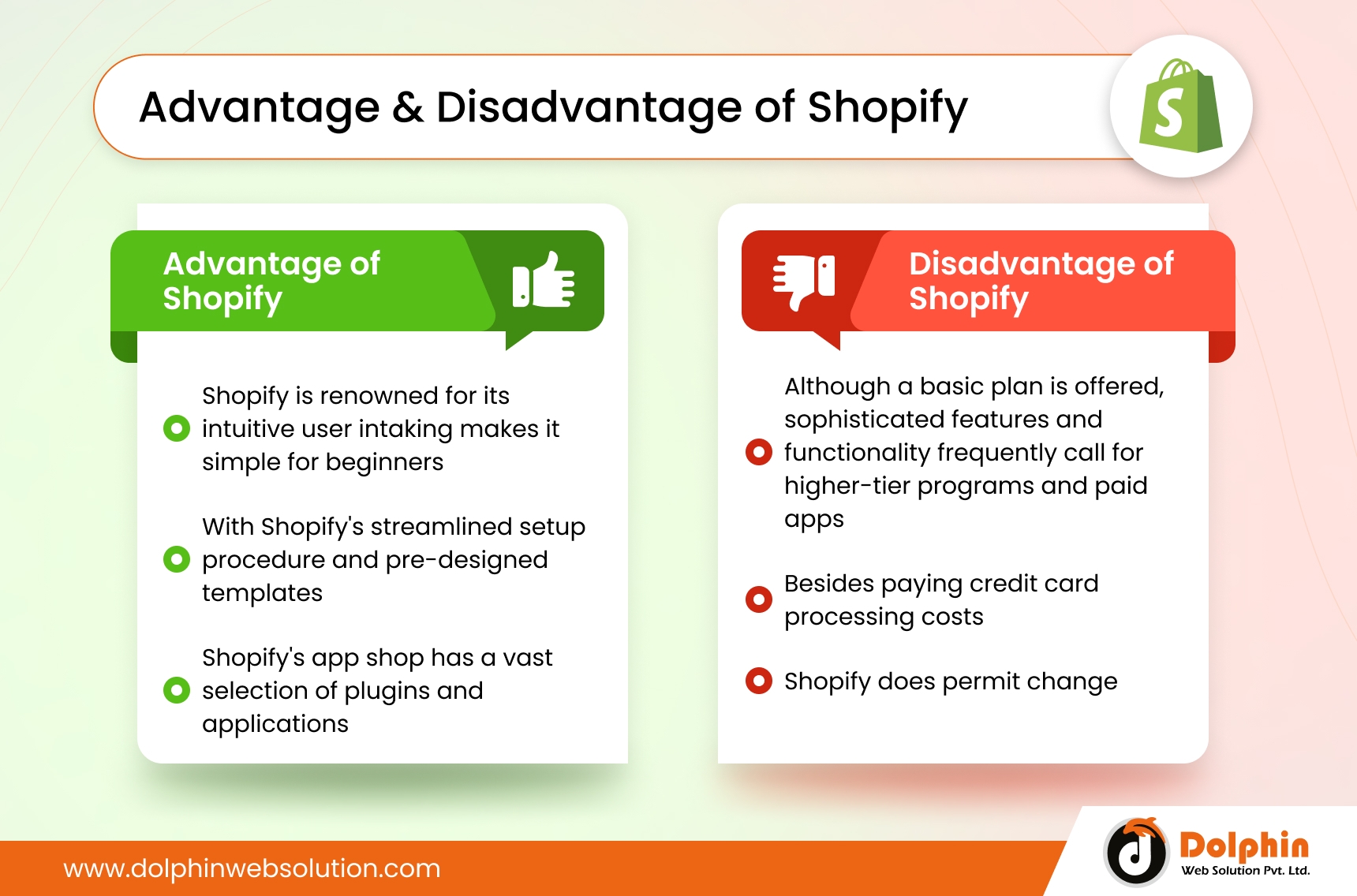
Advantages of Shopify
- Shopify is renowned for its intuitive user intaking makes it simple for beginners to set up and maintain an online store much a lot of technical know-how.
- With Shopify’s streamlined setup procedure and pre-designed templates, you can establish a primary store quickly.
- Shopify’s app shop has a vast selection of plugins and applications that you can use to extend the functionality of your store without writing a lot of code.
- Shopify themes are created with mobile users in mind, guaranteeing a consistent shopping experience across all platforms.
- To protect client data and payment information, Shopify takes care of security measures, including SSL certificates and PCI compliance.
Disadvantages of Shopify
- Although a basic plan is offered, sophisticated features and functionality frequently call for higher-tier programs and paid apps, which could result in a greater monthly fee.
- Besides paying credit card processing costs, you’ll be charged transaction fees if you don’t use Shopify Payments as your payment gateway.
- Shopify does permit change, but it may not be as extensive as other systems that allow for more coding flexibility.
- Although themes can be customized, they may have some design restrictions that make creating distinctive or intricate designs difficult.
- Because Shopify is a proprietary platform, switching to another one might be difficult and could present problems with data transfer.
- Using some advanced e-commerce capabilities may need additional technical skills or the usage of external apps, which could make store administration more difficult.
What is Shopware?
A German e-commerce retail system called Shopware was established in 2000. It allows internet retailers to set up an online store swiftly. Shopware announced the debut of Shopware Cloud, a then-new feature that provides a compelling alternative for D2C (direct-to-consumer) businesses, during Shopware Community Day 2020. A $100 million fundraising round headed by PayPal and Carlyle was announced in February 2022.
Shopware is the simple answer for e-commerce projects, as they like to emphasize, and more than 100,000 clients, including renowned businesses like Borussia Dortmund, Jägermeister, and Haribo, agree.
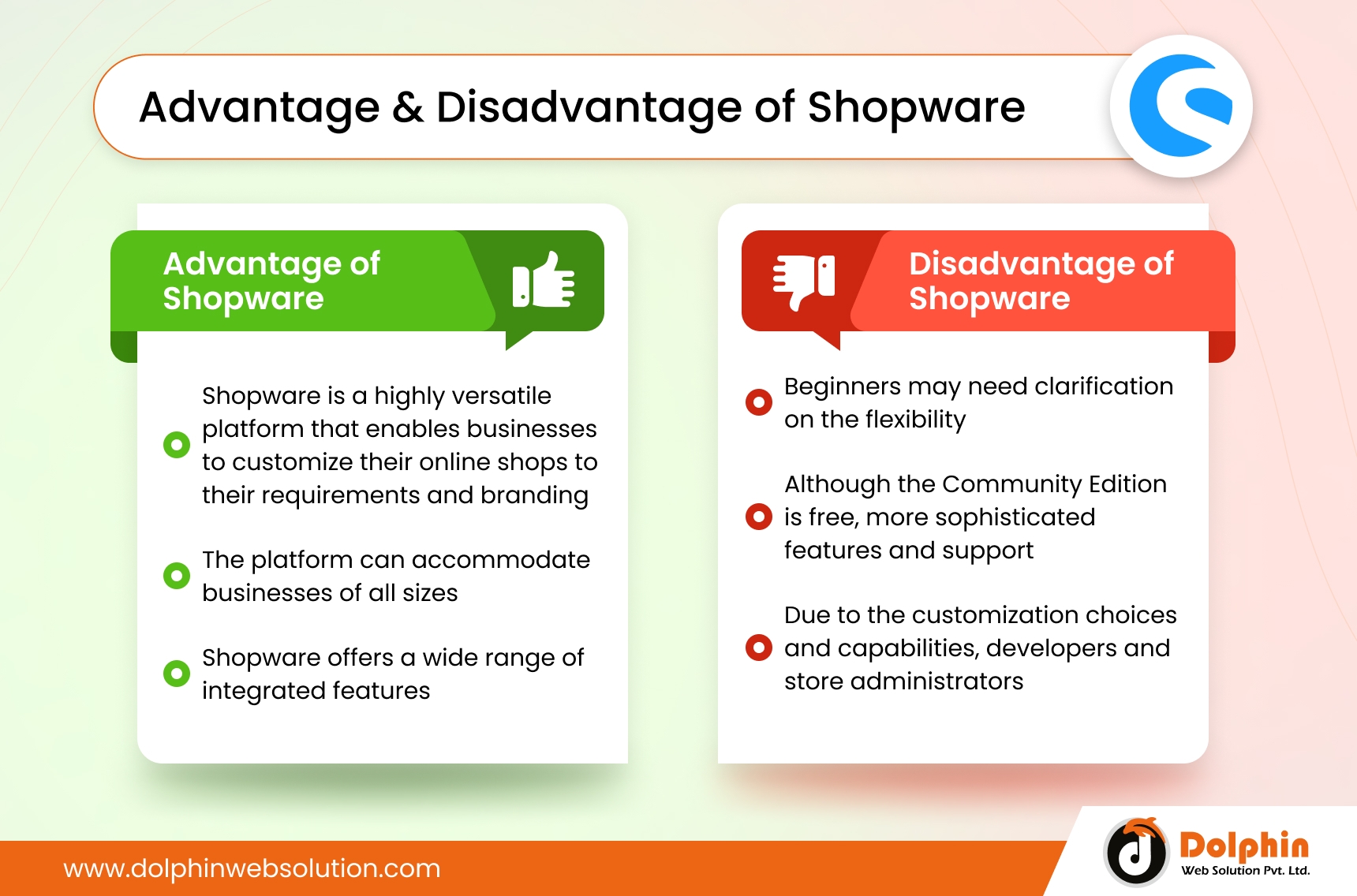
Advantages of Shopware
- Shopware is a highly versatile platform that enables businesses to customize their online shops to their requirements and branding, resulting in an exciting and memorable shopping experience for customers.
- The platform can accommodate businesses of all sizes, from fledgling startups to enormous conglomerates, guaranteeing uninterrupted growth of the online store.
- Shopware offers a wide range of integrated features that negate the need for third-party integrations, such as responsive design, SEO optimization, product administration, marketing tools, and more.
- Shopware has a vibrant developer, designer, and user community, so there are tools for problem-solving, specialized development, and exchanging best practices.
- It is built with current technology and offers a strong foundation for performance, security, and upcoming improvements.
Disadvantages of Shopware
- Beginners may need clarification on the flexibility, making it easier to set up and customize their stores without technical knowledge, even though flexibility is a benefit.
- Although the Community Edition is free, more sophisticated features and support are frequently extra. For smaller companies with tighter budgets, this can be an issue.
- Due to the customization choices and capabilities, developers and store administrators may need time and effort to comprehend and use the platform entirely.
- Shopware does have a marketplace for extensions, although it may not be as comprehensive as some other e-commerce platforms, which could limit the accessibility of particular capabilities.
- There are several popular platforms accessible in the highly competitive e-commerce platform market, which could make it difficult for Shopware to stand out in some areas or businesses.
What is Woocommerce?
To construct an online store, utilize the WordPress WooCommerce plugin. It transforms the standard WordPress operating system into a faultless eCommerce store. WooCommerce makes selling any product or service on your website easy and affordable. You may use it to manage inventory, take secure payments, sell physical and digital goods, and file taxes automatically. The fact that the same firm, Automattic, owns WordPress.com makes WooCommerce’s integration with WordPress so crucial. WooCommerce was designed specifically for WordPress, allowing seamless and straightforward content management system integration. Sell any products.
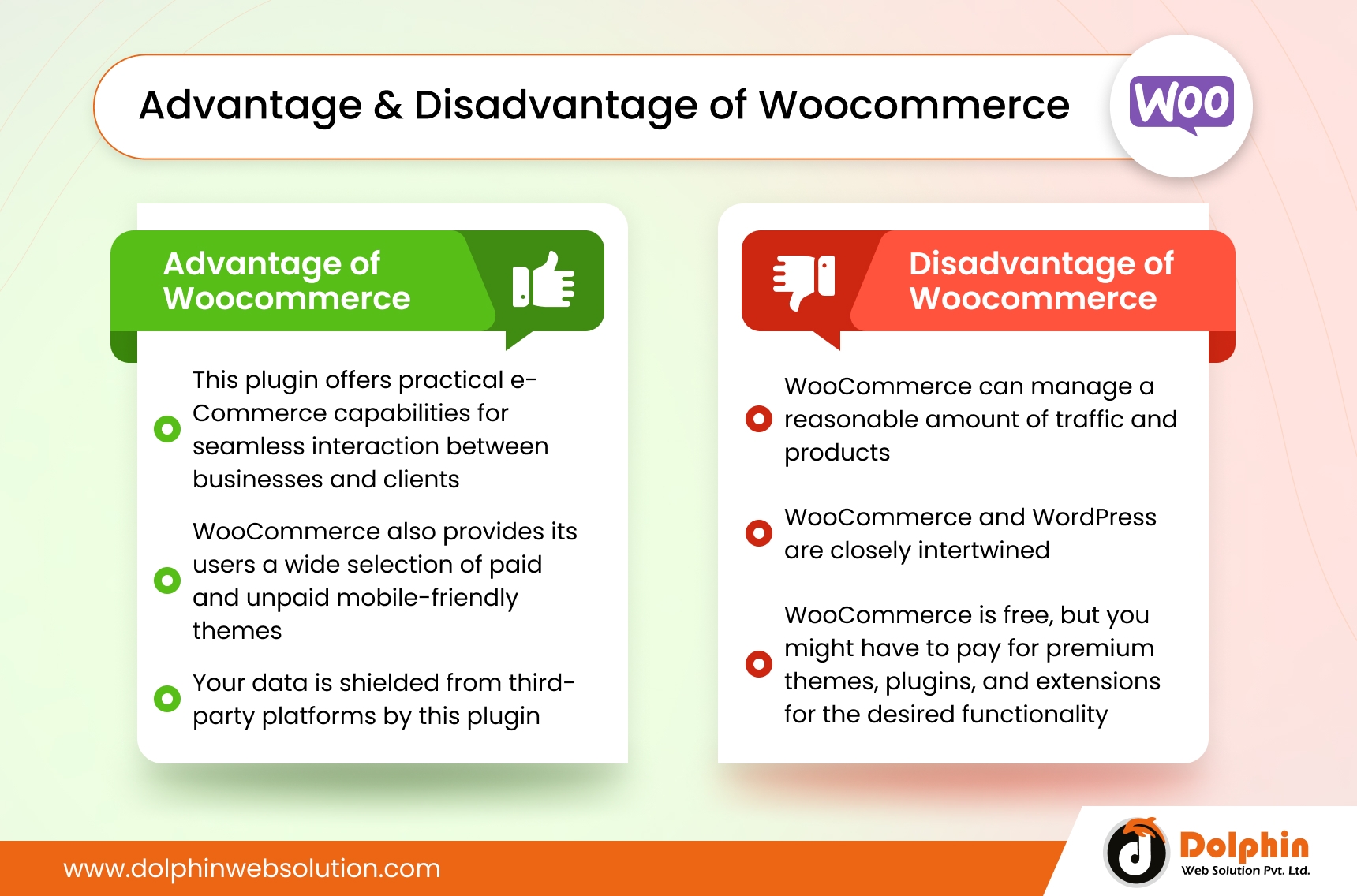
Advantages of Woocommerce
- This plugin offers practical eCommerce capabilities for seamless interaction between businesses and clients.
- WooCommerce also provides its users a wide selection of paid and unpaid mobile-friendly themes. Both the user experience and SEO depend on this.
- Your data is shielded from third-party platforms by this plugin. Additionally, it automatically safeguards all transactions between businesses and their clients.
- WooCommerce includes thorough tutorials and documentation on a variety of subjects. This is beneficial for site designers.
- Any WooCommerce-powered store can be flexibly customized. Additionally, users can modify their AJAX for a more dynamic website.
Disadvantages of Woocommerce
- WooCommerce can manage a reasonable amount of traffic and products, but it may need help with vast catalogues or high traffic volumes, necessitating additional server resources and optimizations.
- WooCommerce and WordPress are closely intertwined. Thus, any flaws or problems with your WordPress installation may also impact your online store.
- WooCommerce may need extra plugins or customization for something standard in other specialized e-commerce platforms.
- WooCommerce is free, but you might have to pay for premium themes, plugins, and extensions for the desired functionality. These expenses may mount up over time.
- If WordPress-based websites, including WooCommerce stores, are not adequately secured, they may become targets for hacking, resulting in data breaches and the theft of critical information.
COMPARISON: Magento vs Shopware vs. Shopify vs WooCommerce
In this thorough comparison of four well-known e-commerce platforms—Magento, Shopware, Shopify, and WooCommerce—discover their significant distinctions and features. Make an informed decision for the success of your online store by investigating each option’s unique strengths, features, and adaptability for various company demands.
Performance
Magento: With its unique features, Magento can easily handle thousands of products and high website traffic. If your business is big or you have ambitious growth goals, you won’t need to move to more complicated software because of Magento’s robust content management system. Thanks to Magento’s simple scalability, you may simply alter the resources your server needs in response to website traffic. This implies that you won’t experience any speed dips or website crashes during unplanned traffic spikes.
Shopify: Shopify performs highly in terms of website performance and speed. In reality, one of its key benefits is the site’s speed.
It performs poorly compared to the other two regarding scalability, which could be problematic if your company expands. You must utilize Shopify Plus, which significantly raises your expenditures if you want easy scalability when your firm grows.
Shopware: Shopware offers an enhanced and seamless e-commerce experience and is famous for its outstanding performance. Shopware offers quick page loads and dependable responsiveness with clever caching methods, effective database queries, and simplified resource utilization. This enables businesses to provide their customers with a seamless and high-speed online buying experience.
WooCommerce: WooCommerce allows for scalability, but people without coding skills could find it challenging to scale their websites to meet requirements. WooCommerce will only scale for you if you have coding experience.
Pricing
Magento: Magento is free virtually when you use it only as an open source. It is simple to download and utilize this version. However, if you choose the Magento Commerce edition, you must fork over a sizable sum of cash. For store owners who generate less than $1 million in annual sales, the licencing fee is $22,000.00. The rate of increase in this expense will depend on your company’s anticipated gross selling revenue. This implies that your financial obligations will increase as your income does. If you run your company on Magento Commerce Cloud instead of Magento Commerce, the licence fee, which ranges from $40,000 to $190,000.00, would be two times more. Because of this, you should only buy this edition if your business is significant.
Shopify : Depending on your chosen tier, price offers several options with additional features. These tiers have monthly fees ranging from $29 to $299. Each price tier has web hosting, an SSL certificate, and a domain name. However, some necessary functionality could necessitate the use of add-ons and tool parties from third parties. These costs will mount as your business expands.
They also charge for the payment process and it varies per transaction, from 0.5% to 2%. Shopify also offers a $9/month option called Shopify Lite. Remember that this level only grants you access to a portion of the online shop. You may sell through your website’s shopping cart and social media by including a Shopify buy button.
Shopware: Shopware offers a wide range of pricing options tailored to different business needs. The Shopware Community Edition (CE), a free, open-source platform, is a good place for smaller businesses and developers to start. For individuals seeking more sophisticated features, the Shopware Professional Edition (PE) offers further capabilities and support at a reasonable price. The Shopware Enterprise Edition (EE) provides specialist solutions supported by individualized services and extensive features for larger companies with specific requirements. The most up-to-date and accurate pricing information may be found on the official Shopware website or by contacting their sales staff.
WooCommerce: Both WooCommerce and WordPress can be used for free. On the website, you can download them. Therefore, small firms and entrepreneurs with limited resources could use this platform to create online storefronts. You must pay for a domain name, an SSL certificate, or website hosting to operate your WooCommerce store. An SSL certificate typically costs $70 per year, a domain registration typically costs $14.99, and hosting services usually cost $8 per month. You’ll also observe that the main WooCommerce store has some limitations as your website grows. You must therefore spend money on third-party plugins to increase the functionality of your store.
SEO
Magento: It offers integrated analytics and excellent SEO tools. It creates URLs and meta descriptions that are search engine friendly, incorporates automatically generated Google site maps into webpages, automates watermarking and image resizing, etc. If you have the necessary skill set, SEO can also be tailored to your website’s demands in addition to these characteristics. To raise the organic ranking of your store, use this Magento SEO tutorial.
Shopify: Shopify is undoubtedly optimized for SEO because it is primarily an eCommerce store. There needs to be more room for customization. There may be SEO techniques that are unique to your company, but if Shopify doesn’t let them, you won’t be able to use them.
Shopware: Shopware offers robust SEO features that let companies optimize their online storefronts for search engines. It provides tools that enable users to increase their website’s visibility and search engine rating, including features like configurable URLs, meta tags, sitemaps, and integration with well-known SEO tools.
WooCommerce: WooCommerce provides a high level of SEO because of the variety of plugins and extensions it has accessible. Users can change the parameters as they see fit to best suit their website.
Level Of Customization
Magento: Of the three, Magento provides the most customization options. You can alter theme features, SEO settings, layouts, and more. Your website can be as distinctive as you want because creating is necessary.
Shopify: Users of Shopify are limited to the essential elements of the themes they select because the platform could be more configurable. There is an additional price if you utilize payment gateways not integrated with Shopify.
Shopware: Shopware provides a high level of customization, allowing companies to design their online shops to meet their specific branding and functionality needs. Users can create customized shopping experiences that fit their unique demands because of the platform’s modular architecture, adaptable templates, and wide-ranging ecosystem of plugins.
WooCommerce: WooCommerce offers extra customization options so you may give your website a unique appearance. You can customize your website’s design, add or remove essential theme elements, and make your extensions and plugins. Customizing your website should be simple if you know how to code, as there is access to CSS, PHP, and HTML type code.
Security
Magento: With enough developers and hosting options, security with Magento will be fine. It consistently releases security updates and prompt notifications to inform retailers of security issues. There are also numerous Magento security extensions available. They can reinforce passwords, check for vulnerabilities, examine changed files, and anticipate restrictions or dangers.
Shopify: Shopify offers you every security measure possible. Consequently, you won’t need to be concerned about getting an SSL or getting hacked. Every time visitors visit your website, Shopify’s integrated SSL ensures they see a small padlock icon close to your URL. This certificate aids in ensuring security when handling customer payments and personal information. Additionally, your visitors can feel secure when using your website. Further, Shopify fully complies with PCI-DSS, allowing your website to take all credit card payments by the most recent laws. Credit and debit card payments can be implemented straight away.
Shopware: Shopware places a high focus on security, and the platform employs several safeguards to safeguard online shops and client information. Data encryption, user role management, secure payment gateways, and routine security upgrades contribute to a safe e-commerce environment, providing customers and businesses with peace of mind.
WooCommerce: Your WooCommerce store must be secured because it is a self-hosted alternative to Shopify. You might require assistance from a hosting company to obtain an SSL certificate. WordPress, however, consistently releases security and bug-fixing updates. To eliminate any dangers, its team continuously examines and modifies the code.
Customer Support
Magento: Magento has a sizable global community that can assist retailers with any problems. Developers and other seasoned store owners will provide you with insightful suggestions. Additionally, Magento creates a knowledge library and assistance centre for its users.
You will have access to the phone, live support, email, and official full-fledged support from Magento if you choose to use Magento Commerce.
Shopify: Before choosing a particular package, you can contact Shopify’s diligent customer care, renowned for its responsiveness. The support staff is reachable by phone, email, and instant messaging around the clock. The second most favoured feature by eCommerce store owners is 24/7 phone support.
Additionally, Shopify offers extensive developer resources, a knowledge base, and a sizable user community. Additionally, you can employ Shopify professionals if you require assistance or want to integrate a third-party solution.
Shopware: Shopware provides thorough customer service to help customers at every step of their e-commerce experience. Users can access tools that help them troubleshoot problems, make the most of the platform’s features, and ensure a smooth and effective online store running, ranging from documentation and community forums to professional assistance packages.
WooCommerce: WooCommerce is an open-source product with a sizable user and community base. Users of WooCommerce can get assistance or technical support from a community of peers, WooExperts, and developers. Small firms gain significantly from this because they might have the funds to hire a qualified developer.
Additionally, WooCommerce offers online guides, tutorials, and product reference resources. These online tutorials will address your typical issues.
Which One Is The Right Choice For Your Online Store?
Making the best e-commerce platform choice is a crucial choice that depends on a wide range of elements. Each of the four contenders—Magento, Shopware, Shopify, and WooCommerce—brings a set of unique advantages to the table. While Shopware finds a mix between creativity and usability, making it particularly appealing to organizations looking to develop distinctive shopping experiences, Magento stands out as a strong option for firms wanting scalability and extensive customization. Aspects including corporate scale, customization requirements, user-friendliness, pricing considerations, and support options must be assessed to find the best fit.
The search for the ideal platform in the world of e-commerce necessitates a strategic analysis. While Shopware’s appeal rests in its ability to balance innovation and user-friendly design, making it the perfect choice for companies looking to establish a distinctive brand, Magento excels for organizations that want significant scalability. Hire ecommerce developer to make a definite choice on which platform to choose for your website. While WooCommerce’s integration with WordPress creates an accessible gateway, especially for those familiar with the WordPress environment, Shopify excels in its simplicity and serves as a welcome hub for small to medium-sized enterprises seeking efficient setups. When choosing a platform, details like customization options, financial considerations, and community support are crucial in assisting businesses in making the best decision. Entrepreneurs can confidently begin their e-commerce journey by evaluating the distinctive characteristics and factors of Magento, Shopware, Shopify, and WooCommerce so that they can determine which route best suits their goals.


